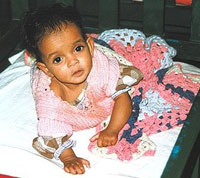Nevirapine protects babies from HIV while breast-feeding
By Margarita Snegireva. A drug that helps prevent babies from catching the AIDS virus at birth can also protect them while nursing, researchers reported on Monday.

Babies of HIV-infected women who were given the drug nevirapine while they breast-fed were half as likely to become infected, the researchers told a meeting in Boston of AIDS experts.
Nevirapine is already widely used to protect babies at birth. A single dose given to the mother as she goes into labor and to the baby at birth cuts transmission by 47 percent.
But babies continue to become infected after birth, via their mothers' breast milk, which can carry the virus. In many developing countries breast-feeding is the only option.
Nevirapine, also marketed under the trade name Viramune (Boehringer Ingelheim), is a non-nucleoside reverse transcriptase inhibitor (NNRTI) used to treat HIV-1 infection and AIDS.
As with other antiretroviral drugs, HIV rapidly develops resistance if nevirapine is used alone, so recommended therapy consists of combinations of three or more antiretrovirals.
A single dose of nevirapine given to both mother and child reduced the rate of HIV transmission by almost 50% compared with a very short course of zidovudine (AZT) prophylaxis, in a clinical trial in Uganda. A subsequent study in Thailand showed that prophylaxis with single-dose nevirapine in addition to zidovudine is more effective than zidovudine alone. These and other trials have led the World Health Organization to endorse the use of single-dose nevirapine prophylaxis in many developing world settings as a cost-effective way of reducing mother-to-child transmission.
A major concern with this approach is that NNRTI resistance mutations are commonly observed in both mothers and infants after single-dose nevirapine, and may compromise the response to future NNRTI-containing regimens. A short course of maternal zidovudine/lamivudine is recommended by the U.S. Public Health Service Task Force to reduce this risk.
Subscribe to Pravda.Ru Telegram channel, Facebook, RSS!


